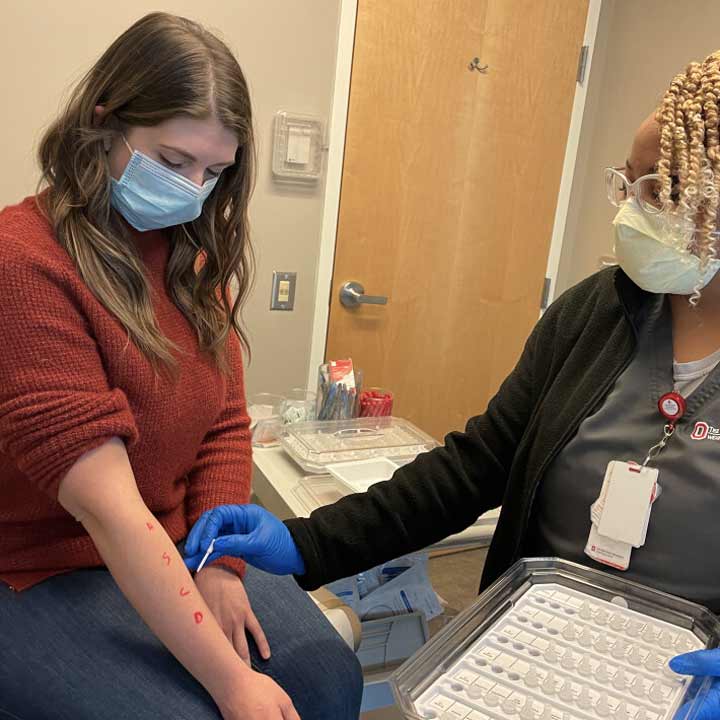
Allergic Rhinitis (Hay Fever)
Allergy symptoms can be extremely frustrating and may affect the way you’re able to live your life. We understand this concern and are committed to providing you with a high level of care. At The Ohio State University Wexner Medical Center, we’ll listen to your needs, diagnose your condition and work with you to select a treatment plan that will improve your life.
As a patient experiencing allergies, you’ll receive care that’s customized to your specific needs. Our allergy specialists may suggest the following:
And if your needs are more advanced, we can handle that, too. At Ohio State, you’ll have direct access to medical experts from across the Ohio State Wexner Medical Center, including our expertise in sinus care, asthma and more.
Our team of allergy specialists in Columbus, Ohio, have completed specialized education and training in all areas that affect your nose and sinuses.
Allergies can cause a number of conditions, some more serious than others.
Seasonal allergies: Seasonal allergies occur when your immune system reacts to an outdoor allergen, such as pollen. Seasonal allergy symptoms include sneezing, runny nose and watery eyes.
Allergic asthma: A majority of people with allergies or asthma experience both conditions. Inhaling allergens such as dust mite droppings, mold, pet dander and pollen creates asthmatic symptoms. Airway obstruction, inflammation, coughing, wheezing, shortness of breath and chest tightness are common symptoms of allergic asthma.
Allergy-related runny nose, blocked nose and postnasal drip: Allergic reactions cause membranes to swell and become congested. Inflammation, pain, pressure and mucus are the result, culminating in a stuffy, runny nose. If the swelling isn’t controlled, it can obstruct normal sinus drainage, leading to sinus infections. Nasal congestion can also obstruct proper Eustachian tube (ear tube) function, resulting in fluid behind the eardrum.
Allergies occur when your immune system reacts to something effectively harmless — such as pollen or pet dander. Your body’s immune system is trained to fight germs and infections, but during an allergic reaction, your immune system mistakes an allergen for something more harmful.
The severity of allergies is different for each person. In extreme cases, allergies can lead to anaphylaxis — a potentially life-threatening emergency. Since the severity of allergies is unique to every person, you’ve come to the right place to deal with your allergies. At the Ohio State Wexner Medical Center, our allergists have the expertise to treat all cases, from mild irritations to potentially life-threatening reactions.
Allergy symptoms, including seasonal allergy symptoms, may include:
Symptoms are likely to persist over many weeks or for an entire allergy season.
Once your immune system wrongly identifies an allergen trigger like pollen or mold as harmful, your body will continue creating antibodies when you encounter those allergens again. You might be more likely to develop an allergy if you have a family history of allergies or if you have asthma.
Learn more about the most common allergens.
Although over-the-counter medicines are available for the symptoms of allergies, you should consider starting with a visit to one of our board-certified allergists or immunologists who can perform allergy testing to identify the source of your symptoms. Treating your allergies begins with learning for sure what your allergy triggers are — and aren’t.
Once you have the results of your allergy tests, your Ohio State allergy doctor can develop a more targeted treatment for you. One effective treatment is immunotherapy, which is when you’re given small, controlled exposure to your allergic triggers to train your immune system to not overreact. Other treatment methods include oral antihistamines, eye drops, nasal steroid sprays and decongestants. Our allergists will work with you to meet your needs and provide you with the customized care you deserve.
Don’t have MyChart? Create an account